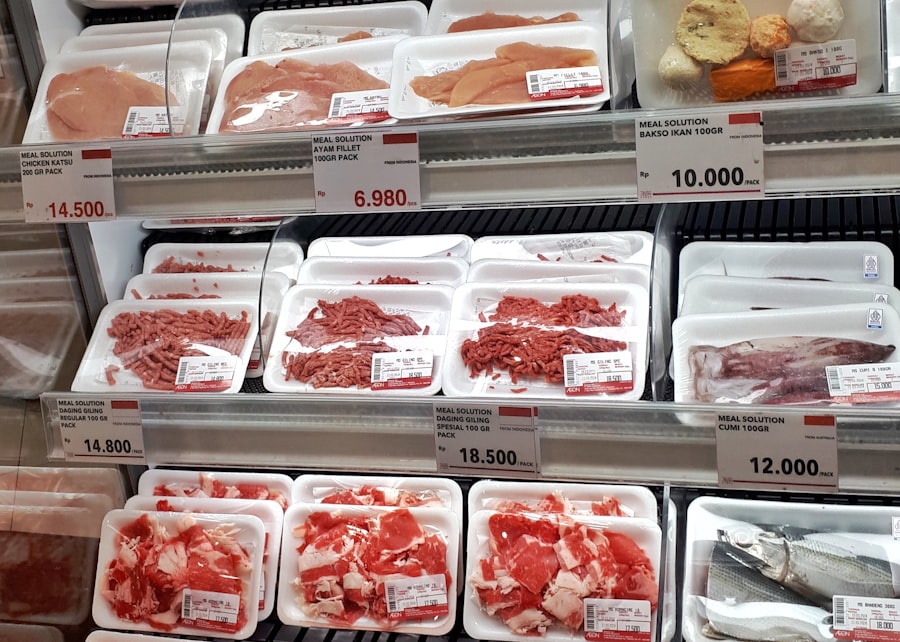In recent decades, the consumption of processed meat has surged dramatically, becoming a staple in many diets around the world. This rise can be attributed to various factors, including the fast-paced lifestyle of modern society, which often prioritizes convenience over nutritional value. Processed meats, such as sausages, hot dogs, and deli meats, have become easily accessible and are often marketed as quick meal solutions.
As a result, they have found their way into lunchboxes, barbecues, and dinner tables, leading to an increase in their overall consumption. Moreover, the globalization of food markets has played a significant role in the proliferation of processed meat products. With the advent of international trade agreements and advancements in food preservation technologies, processed meats have become available in regions where they were once scarce.
As processed meats continue to dominate the market, concerns about their health implications and environmental impact have begun to surface, prompting a reevaluation of their place in contemporary diets.
Key Takeaways
- Processed meat consumption has risen significantly in recent years, leading to concerns about its impact on health and the environment.
- Processed meat refers to meat that has been preserved and flavored through methods such as smoking, curing, or adding preservatives.
- Consuming processed meat has been linked to an increased risk of various health issues, including heart disease, diabetes, and certain types of cancer.
- There is a strong association between the consumption of processed meat and an elevated risk of developing cancer, particularly colorectal cancer.
- The meat industry plays a significant role in the processing of meat and has been criticized for misleading marketing and labeling practices.
What is Processed Meat?
Processed meat refers to any meat that has been modified through curing, smoking, fermentation, or the addition of preservatives to enhance flavor or extend shelf life. This category encompasses a wide range of products, including bacon, ham, salami, and various types of sausages. The processing methods used can vary significantly, with some involving minimal alterations while others may include extensive chemical treatments.
Regardless of the method, the common thread is that these meats are not consumed in their natural state. The classification of processed meat is crucial for understanding its implications for health and nutrition. While fresh meat is often lauded for its protein content and essential nutrients, processed varieties can contain high levels of sodium, unhealthy fats, and additives that may pose health risks.
The distinction between fresh and processed meat is not merely academic; it has real-world consequences for consumers who may unknowingly choose products that could adversely affect their health.
The Health Risks of Consuming Processed Meat

The health risks associated with consuming processed meat have garnered increasing attention from researchers and health professionals alike. Numerous studies have linked high consumption of processed meats to various health issues, including heart disease, diabetes, and obesity. The high levels of sodium and saturated fats found in many processed meat products can contribute to hypertension and elevated cholesterol levels, which are significant risk factors for cardiovascular diseases.
In addition to cardiovascular concerns, processed meats have been scrutinized for their potential impact on metabolic health. The presence of preservatives and additives, such as nitrates and nitrites, has raised alarms regarding their long-term effects on human health. These substances can form harmful compounds during digestion, leading to inflammation and other metabolic disturbances.
As awareness of these risks grows, many individuals are reconsidering their dietary choices and seeking healthier alternatives.
The Link Between Processed Meat and Cancer
| Study | Findings |
|---|---|
| World Health Organization (WHO) | Processed meat is classified as a Group 1 carcinogen, meaning it is carcinogenic to humans |
| American Institute for Cancer Research (AICR) | Consuming 50 grams of processed meat per day increases the risk of colorectal cancer by 18% |
| National Cancer Institute | Processed meat contains chemicals that are formed during processing and cooking, which may increase the risk of cancer |
One of the most alarming associations made in recent years is the link between processed meat consumption and cancer. The World Health Organization (WHO) classified processed meats as a Group 1 carcinogen in 2015, indicating that there is sufficient evidence to suggest that these products can cause cancer in humans. Specifically, studies have shown a strong correlation between processed meat intake and colorectal cancer, with increased risk observed among those who consume large quantities.
The mechanisms behind this link are complex and multifaceted. Some researchers suggest that the cooking methods commonly used for processed meats—such as grilling or smoking—can produce carcinogenic compounds. Additionally, the preservatives used in these products may contribute to DNA damage over time.
As more evidence emerges regarding the cancer risks associated with processed meats, public health campaigns are increasingly focused on educating consumers about these dangers.
The Impact of Processed Meat on the Environment
The environmental impact of processed meat production is another critical aspect that cannot be overlooked. The meat industry is a significant contributor to greenhouse gas emissions, deforestation, and water pollution. The intensive farming practices required to produce large quantities of meat often lead to habitat destruction and biodiversity loss.
Furthermore, the processing of meat itself requires substantial energy and resources, exacerbating its environmental footprint. As global demand for meat continues to rise, the environmental consequences become more pronounced. Livestock farming is responsible for a considerable portion of methane emissions—a potent greenhouse gas—making it a key player in climate change discussions.
The processing phase adds another layer of complexity to this issue, as it often involves energy-intensive methods that further strain natural resources. As awareness grows about the environmental ramifications of meat consumption, many are advocating for more sustainable dietary practices.
The Role of the Meat Industry in Processing

The meat industry plays a pivotal role in the processing of meat products, shaping not only what is available on supermarket shelves but also influencing consumer behavior through marketing strategies. Large corporations dominate this sector, often prioritizing profit margins over health considerations or environmental sustainability. This focus on efficiency has led to the mass production of processed meats that are cheap and convenient but may lack nutritional value.
Moreover, the industry’s practices can perpetuate a cycle of unhealthy eating habits among consumers. By heavily marketing processed meats as quick meal solutions or indulgent treats, the industry encourages higher consumption rates without adequately addressing the associated health risks. This dynamic raises ethical questions about corporate responsibility and consumer education in an age where information about food choices is more accessible than ever.
Misleading Marketing and Labeling of Processed Meat
Misleading marketing and labeling practices within the processed meat industry further complicate consumers’ ability to make informed choices. Many products are marketed as “natural” or “healthy,” despite containing high levels of preservatives or unhealthy fats. Terms like “lean” or “low-fat” can create a false sense of security among consumers who may believe they are making healthier choices when purchasing these items.
Additionally, labeling regulations can vary significantly by region, leading to confusion among consumers about what constitutes a healthy product. For instance, some labels may highlight certain nutritional benefits while downplaying or omitting information about harmful additives or high sodium content. This lack of transparency can mislead consumers into believing they are making healthier dietary choices when they may be inadvertently increasing their risk for various health issues.
The Documentary’s Investigation and Findings
A recent documentary investigating the processed meat industry has shed light on many of these pressing issues. Through interviews with experts and firsthand accounts from consumers, the film explores the complexities surrounding processed meat consumption and its implications for health and the environment. The documentary highlights alarming statistics regarding cancer rates linked to processed meat consumption while also delving into the environmental degradation caused by industrial meat production.
The filmmakers conducted extensive research into the practices of major meat processing companies, revealing troubling trends in how these corporations prioritize profit over consumer health. By exposing the realities behind marketing claims and production methods, the documentary aims to empower viewers with knowledge that can influence their dietary choices. It serves as a call to action for individuals to reconsider their relationship with processed meats and advocate for more sustainable food systems.
Interviews with Experts and Health Professionals
Interviews with experts and health professionals featured in the documentary provide valuable insights into the ongoing debate surrounding processed meat consumption. Nutritionists emphasize the importance of understanding what constitutes a healthy diet and caution against relying too heavily on processed foods. They advocate for whole foods—fruits, vegetables, whole grains—as essential components of a balanced diet while highlighting the potential dangers associated with excessive processed meat intake.
Oncologists also weigh in on the cancer risks linked to processed meats, stressing that individuals should be aware of their consumption patterns. They encourage regular screenings and lifestyle modifications as proactive measures against cancer risk factors. These expert opinions underscore the need for public awareness campaigns aimed at educating consumers about the potential dangers associated with processed meats while promoting healthier alternatives.
The Future of Processed Meat Consumption
As awareness grows regarding the health risks and environmental impact associated with processed meats, the future of their consumption remains uncertain. Many consumers are beginning to shift towards plant-based diets or seek out alternatives that prioritize sustainability and health. This trend is reflected in the increasing popularity of plant-based protein sources and alternative meat products designed to mimic traditional meats without the associated risks.
The meat industry is also responding to these changes by exploring innovative processing methods that reduce harmful additives while promoting transparency in labeling practices. Some companies are investing in sustainable farming practices or developing lab-grown meats as potential solutions to address both health concerns and environmental challenges. As consumer preferences evolve, it is likely that the landscape of processed meat consumption will continue to change dramatically.
Alternatives to Processed Meat
In light of growing concerns about processed meats, numerous alternatives have emerged that offer healthier options without sacrificing flavor or convenience. Plant-based proteins such as lentils, chickpeas, tofu, and tempeh provide excellent sources of nutrition while being lower in saturated fats and free from harmful additives commonly found in processed meats. These alternatives not only support individual health but also contribute positively to environmental sustainability.
Products made from pea protein or other plant sources are gaining traction among consumers looking for healthier options without compromising on taste. As these alternatives become more mainstream, they present an opportunity for individuals to reduce their reliance on processed meats while enjoying diverse culinary experiences that align with their health goals.
In conclusion, while processed meat has become a prevalent part of modern diets due to convenience and accessibility, its associated health risks and environmental impacts cannot be ignored. As consumers become more informed about these issues through documentaries and expert insights, there is hope for a shift towards healthier eating habits and sustainable food practices that prioritize well-being over convenience.
In recent years, the conversation around processed meat and its health implications has gained significant attention, particularly through documentaries that delve into the subject. One such documentary explores the various health risks associated with consuming processed meats, highlighting studies that link them to serious health conditions. For those interested in further reading on this topic, a related article can be found on the Hey Did You Know This website. This article provides additional insights and complements the documentary’s findings by discussing the impact of processed meats on health and offering tips for healthier dietary choices. You can read more about it by visiting this link.
WATCH THIS! 🌭The 100-Year Scam That Invented Hot Dogs
FAQs
What is a documentary on processed meat?
A documentary on processed meat is a film or video production that explores the production, consumption, and potential health and environmental impacts of processed meat products.
What are some common topics covered in a documentary on processed meat?
Common topics covered in a documentary on processed meat may include the use of additives and preservatives, the impact of processed meat consumption on human health, the environmental impact of meat production, and the ethical considerations of factory farming.
Are there any well-known documentaries on processed meat?
Yes, there are several well-known documentaries on processed meat, such as “Food, Inc.,” “What the Health,” and “Cowspiracy.” These documentaries have gained attention for their exploration of the meat industry and its effects on health and the environment.
What are some potential health concerns associated with processed meat consumption?
Processed meat consumption has been linked to an increased risk of certain health conditions, including heart disease, diabetes, and certain types of cancer. This is due to the high levels of sodium, nitrates, and other additives found in processed meats.
What are some potential environmental impacts of processed meat production?
The production of processed meat, particularly from factory farming, can have significant environmental impacts, including deforestation, water pollution, and greenhouse gas emissions. This is due to the large-scale production of feed crops, the methane emissions from livestock, and the waste generated by meat processing facilities.
